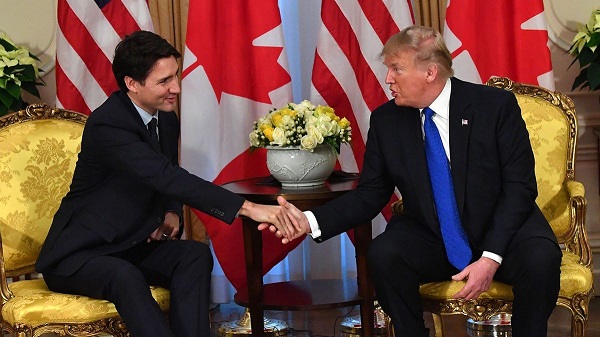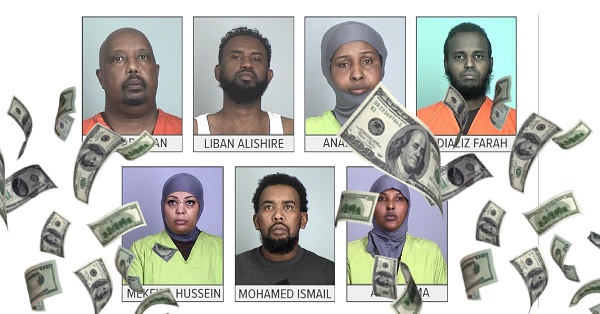Business
Ottawa Appoints Former Trudeau Intelligence Adviser as “Fentanyl Czar”

 Sam Cooper
Sam Cooper
Late Tuesday, Justin Trudeau’s administration appointed former RCMP deputy commissioner Kevin Brosseau as Canada’s new “fentanyl czar”—a role created as part of a last-minute deal to avert a major trade war with the United States.
As the government’s lead on the file, Brosseau is tasked with working closely with U.S. counterparts and law enforcement agencies to “accelerate Canada’s ongoing work to detect, disrupt, and dismantle the fentanyl trade,” according to a statement from the Prime Minister’s Office.
“The scourge of fentanyl must be wiped from the face of the Earth, its production must be shut down, and its profiteers must be punished,” the statement continued.
Brosseau, who recently served as deputy national security and intelligence adviser to Prime Minister Justin Trudeau, reportedly brings extensive experience in drug enforcement and organized crime investigations.
“His demonstrated expertise tackling drug trafficking, organized crime networks, and other national security threats will bring tremendous value to this position,” the government statement added.
Financial Fallout: Banks Face Heightened Scrutiny
While the Fentanyl Czar is a major pillar of Trudeau’s promised plan, the most controversial measures are yet to come, including a plan to designate cartels as terrorist organizations. Experts believe that this move could have sweeping impacts on Canada’s financial sector.
Canadian banks, which have long faced criticism for weak anti-money laundering enforcement, may soon face heightened scrutiny, stricter compliance measures, and increased risk exposure. The new designation could lead to U.S. law enforcement aggressively tracking cartel-linked transactions in Canada, with potential repercussions for financial institutions that fail to act.
The Fentanyl Czar appointment is part of a broader $1.3 billion border security plan, which includes:
- New helicopters and advanced surveillance technology
- Increased personnel at critical border points
- Closer coordination with U.S. agencies to disrupt fentanyl trafficking
“I just had a good call with President Trump,” Trudeau wrote on February 3, announcing that his administration had secured a temporary reprieve from U.S. trade penalties. “Nearly 10,000 frontline personnel are and will be working on protecting the border.”
Trudeau also outlined plans to:
- Designate cartels as terrorist organizations
- Implement 24/7 surveillance of high-risk border crossings
- Launch a Canada–U.S. Joint Strike Force targeting organized crime and money laundering
- Sign a new $200 million intelligence directive focused on fentanyl
With Trump’s sweeping 25% tariffs on Canadian exports still looming, the coming weeks will test whether Ottawa’s promised fentanyl crackdown satisfies Washington—or if Canada’s financial institutions and urban real estate markets, deeply exposed to fentanyl money laundering according to U.S. and Canadian experts, become the next battleground.
More to come.
The Bureau is a reader-supported publication. To receive new posts and support my work, consider becoming a free or paid subscriber.
Business
Feds pull the plug on small business grants to Minnesota after massive fraud reports

The Small Business Administration is moving to freeze grant money flowing into Minnesota after explosive allegations of large-scale fraud tied to state oversight failures, with SBA Administrator Kelly Loeffler signaling an immediate crackdown following recent independent reporting.
In a series of comments shared publicly by conservative commentator Benny Johnson, Loeffler said the agency is “cutting off and clawing back” SBA grants to the state while investigators dig deeper into what she described as a rapidly expanding fraud network.
Johnson wrote that Loeffler told him she was “disgusted and sickened” after reviewing footage from YouTuber Nick Shirley, whose on-the-ground reporting in Minnesota highlighted what he said were sham daycare and learning centers collecting millions in public funds despite showing little or no sign of legitimate operations.
According to Johnson, Loeffler blamed the situation on Democrat Gov. Tim Walz, accusing his administration of refusing to enforce basic rules governing small businesses and allowing fraud to flourish unchecked.
Johnson said Loeffler told him SBA investigators were able to identify roughly half a billion dollars in suspected fraud within days of focusing on Minnesota, calling the operation an “industrial-scale crime ring” that ripped off American taxpayers.
“Pending further review, SBA is freezing all grant funding to the state in order to stop the rampant waste of taxpayer dollars and uncover the full depth of fraud,” Loeffler said, according to Johnson’s account, adding that the total scope of the scheme remains unknown and could reach into the billions.
The controversy gained national traction after Shirley posted video of himself visiting multiple facilities, including a South Minneapolis site known as the Quality Learning Center, which he reported was approved for federal aid for up to 99 children but appeared inactive during normal business hours.
The center’s sign, Shirley noted, even misspelled the word “learning” as “learing.”
In the footage, a woman inside the building is heard shouting “Don’t open up,” falsely claiming Shirley and his colleague were Immigration and Customs Enforcement agents.
After the video circulated, Rep. Tom Emmer, a Republican, publicly demanded answers from Walz, questioning how such facilities were approved for millions in taxpayer funding.
Shirley’s reporting followed earlier investigations, including a November report by City Journal alleging that members of Minnesota’s Somali community had sent millions of dollars in stolen taxpayer funds overseas, with some of that money reportedly ending up in the hands of Al-Shabaab, a U.S.-designated terrorist organization.
While Walz’s administration has insisted it takes fraud seriously, the SBA’s decision to halt grant funding marks one of the most aggressive federal responses yet, underscoring how rapidly a local scandal has escalated into a national reckoning over oversight, enforcement, and accountability in Minnesota.
Business
Stripped and shipped: Patel pushes denaturalization, deportation in Minnesota fraud

FBI Director Kash Patel issued a blunt warning over the weekend as federal investigators continue unraveling a sprawling fraud operation centered in Minnesota, saying the hundreds of millions already uncovered represent “just the tip of a very large iceberg.”
In a lengthy statement posted to social media, Patel said the Federal Bureau of Investigation had quietly surged agents and investigative resources into the state well before the scandal gained traction online. That effort, he said, led to the takedown of an estimated $250 million fraud scheme that stole federal food aid intended for vulnerable children during the COVID pandemic.
According to Patel, the investigation exposed a network of sham vendors, shell companies, and large-scale money laundering operations tied to the Feeding Our Future case. Defendants named by the FBI include Abdiwahab Ahmed Mohamud, Ahmed Ali, Hussein Farah, Abdullahe Nur Jesow, Asha Farhan Hassan, Ousman Camara, and Abdirashid Bixi Dool, each charged with offenses ranging from wire fraud to conspiracy and money laundering.
Patel also said Abdimajid Mohamed Nur and others were charged in a separate attempt to bribe a juror with $120,000 in cash. He noted that several related cases have already resulted in guilty pleas, prison sentences of up to 10 years, and nearly $48 million in restitution orders.
Despite those outcomes, Patel warned the case is far from finished.
“The FBI believes this is just the tip of a very large iceberg,” he said, adding that investigators will continue following the money and that the probe remains ongoing. Patel further confirmed that many of those convicted are being referred to immigration authorities for possible denaturalization and deportation proceedings where legally applicable.
The renewed focus follows a viral video circulated by independent journalist Nick Shirley, which appeared to show multiple childcare and learning centers operating as empty or nonfunctional storefronts. The footage sparked immediate backlash from Republicans, including Vice President JD Vance.
House Majority Whip Tom Emmer accused Minnesota Gov. Tim Walz of sitting idle while massive sums were stolen from taxpayers. Walz addressed the allegations during a November press conference, before the full scope of the fraud became public, saying the scandal “undermines trust in government” and threatens programs meant to help vulnerable residents.
“If you’re committing fraud, no matter where you come from or what you believe, you are going to go to jail,” Walz said at the time.
Authorities say the alleged schemes date back to at least 2015, beginning with overbilling Minnesota’s Child Care Assistance Program and later expanding into Medicaid-funded disability and housing programs. One such housing initiative, aimed at helping seniors and disabled residents secure stable housing, was shut down earlier this year after officials cited what they described as large-scale fraud.
The fallout has already reached the federal level. Last month, President Trump announced the suspension of Temporary Protected Status for Somali nationals, arguing that Minnesota had become a hub for organized welfare fraud and money laundering activity.
-

 Digital ID2 days ago
Digital ID2 days agoCanadian government launches trial version of digital ID for certain licenses, permits
-

 Agriculture2 days ago
Agriculture2 days agoEnd Supply Management—For the Sake of Canadian Consumers
-

 Alberta2 days ago
Alberta2 days agoAlberta Next Panel calls to reform how Canada works
-

 International1 day ago
International1 day agoGeorgia county admits illegally certifying 315k ballots in 2020 presidential election
-

 Business2 days ago
Business2 days agoThe “Disruptor-in-Chief” places Canada in the crosshairs
-

 Artificial Intelligence2 days ago
Artificial Intelligence2 days agoUK Police Pilot AI System to Track “Suspicious” Driver Journeys
-

 Energy1 day ago
Energy1 day ago‘The electric story is over’
-

 International2 days ago
International2 days agoWorld-leading biochemist debunks evolutionary theory







